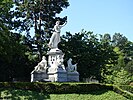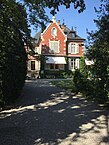
Basel
Basel (/ˈbɑːzəl/ BAH-zəl, German: [ˈbaːzl̩] ), also known as Basle (/bɑːl/ BAHL),[note 1] is a city in northwestern Switzerland on the River Rhine (at the transition from the High to the Upper Rhine).[4] Basel is Switzerland's third-most-populous city (after Zürich and Geneva), with 177,595 inhabitants within the city municipality limits.[5] The official language of Basel is Swiss Standard German and the main spoken language is the local Basel German dialect.[6]
"Basle" and "Basilea" redirect here. For other uses, see Basle (disambiguation), Basilea (disambiguation), and Basel (disambiguation).
Basel
Basle
Basle
Switzerland
Regierungsrat
with 7 members
Lukas Engelberger SPS/PSS
(as of January 2024)
Grosser Rat
with 100 members
23.85 km2 (9.21 sq mi)
261 m (856 ft)
366 m (1,201 ft)
244.75 m (802.99 ft)
177,595
7,400/km2 (19,000/sq mi)
German: Basler(in), French: Bâlois(e), Italian: Basilese
2701
CH-BS
Allschwil (BL), Hégenheim (FR-68), Binningen (BL), Birsfelden (BL), Bottmingen (BL), Huningue (FR-68), Münchenstein (BL), Muttenz (BL), Reinach (BL), Riehen (BS), Saint-Louis (FR-68), Weil am Rhein (DE-BW)
Basel is commonly considered to be the cultural capital of Switzerland[7][8] and the city is famous for its many museums, including the Kunstmuseum, which is the first collection of art accessible to the public in the world (1661) and the largest museum of art in Switzerland, the Fondation Beyeler (located in Riehen), the Museum Tinguely and the Museum of Contemporary Art, which is the first public museum of contemporary art in Europe.[9] Forty museums are spread throughout the city-canton, making Basel one of the largest cultural centres in relation to its size and population in Europe.[10]
The University of Basel, Switzerland's oldest university (founded in 1460),[11] and the city's centuries-long commitment to humanism, have made Basel a safe haven at times of political unrest in other parts of Europe for such notable people as Erasmus of Rotterdam,[12] the Holbein family, Friedrich Nietzsche,[13] Carl Jung, and in the 20th century also Hermann Hesse[14] and Karl Jaspers.[15]
Basel was the seat of a Prince-Bishopric starting in the 11th century, and joined the Swiss Confederacy in 1501.[16] The city has been a commercial hub and an important cultural centre since the Renaissance,[17] and has emerged as a centre for the chemical and pharmaceutical industries in the 20th century.[18] In 1897, Basel was chosen by Theodor Herzl as the location for the first World Zionist Congress, and altogether the congress was held there ten times over a time span of 50 years, more than in any other location.[19] The city is also home to the world headquarters of the Bank for International Settlements.[20] The name of the city is internationally known through institutions like the Basel Accords,[21] Art Basel[22] and FC Basel.[23]
Basel is Switzerland's main centre for the pharmaceutical industry, hosting both Novartis and Roche.[24]
In 2019 Basel was ranked the tenth most liveable city in the world by Mercer.[25]
Name[edit]
The name of Basel is first recorded as Basilia in the 3rd century (237/8), at the time referring to the Roman castle. This name is mostly interpreted as deriving from the personal name Basilius, from a toponym villa Basilia ("estate of Basilius") or similar.[26]
Another suggestion derives it from a name Basilia attested in northern France as a development of basilica, the term for a public or church building (as in Bazeilles), but all of these names reference early church buildings of the 4th or 5th century and cannot be adduced for the 3rd-century attestation of Basilia.[27][28]
By popular etymology, or simple assonance, the basilisk becomes closely associated with the city, used as heraldic supporter from 1448, represented on coins minted by the city, and frequently found in ornaments.
The Middle French form Basle was adopted into English, but this form has fallen gradually out of use although it continues to be used in some sections of British English including the BBC.[29][30] Currently, the spelling Basel is most often used, to match the official German spelling. In French Basle was still in use in the 18th century, but was gradually replaced by the modern French spelling Bâle. In Icelandic, the city is recorded as Buslaraborg in the 12th-century itinerary Leiðarvísir og borgarskipan.
Geography and climate[edit]
Location[edit]
Basel is located in Northwestern Switzerland and is commonly considered to be the capital of that region.[61] It is close to the point where the Swiss, French and German borders meet, and Basel also has suburbs in France and Germany.[62] As of 2016, the Swiss Basel agglomeration was the third-largest in Switzerland, with a population of 541,000[63] in 74 municipalities in Switzerland (municipal count as of 2018).[64] The metropolitan area, called the Trinational Eurodistrict of Basel (TEB), consists of 62 suburban communes including municipalities in neighboring countries, and counted 829,000 inhabitants in 2007.[65]
Culture[edit]
Main sights[edit]
The red sandstone Münster, one of the foremost late-Romanesque/early Gothic buildings in the Upper Rhine, was badly damaged in the great earthquake of 1356, rebuilt in the 14th and 15th century, extensively reconstructed in the mid-19th century and further restored in the late 20th century.[127] A memorial to Erasmus lies inside the Münster. The City Hall from the 16th century is located on the Market Square and is decorated with fine murals on the outer walls and on the walls of the inner court.
Notable people who were born or grew up in Basel:















